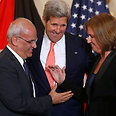
Kerry, Livni and Erekat. 'America will determine if we will have peace here'
צילום: AP
Int'l pressure for peace
Op-ed: Pressure from US and Europe, together with Arab initiative, may lead to successful talks
The peace camp, the settlers' camp and the skeptics' camp are all wondering: Is it possible that the American Kerry initiative to restart the Israeli-Palestinian peace process will lead the sides to a new situation?
The balance of power between Israel and the Palestinians is in Israel's favor from every possible aspect. Thus, there has been no change from the foundation of the struggle between the two nations over the realization of the vision of self-definition in the form of a nation state.
The Zionist movement's leadership, and then the Israeli government, were wise enough to grow stronger militarily, economically and politically, leaving the Palestinian rival without a chance of stopping the Jewish state from the process of taking hold of the different parts of the Land of Israel.
The Palestinian attempt to do so through generations of terrorism has failed. The effort to achieve it diplomatically has been curbed. The Israeli government has strived consistently in the past decade to cancel the "Green Line" distinguishing between Israeli territory and the West Bank and cause the international community to have no other choice but to agree to the annexation of Area C and east Jerusalem.
From an international standpoint, peace has always depended on the sides' willingness to divide the land. The division idea was implied in the Balfour Declaration, formed in the reports of different committees dealing with the Palestinian conflict during the British Mandate era, in the United Nations Partition Plan which led to the declaration of Israel's independence, and even in the Armistice Agreements signed in Rhodes.
Palestinians have no assets
In Security Council Resolutions 242 and 338 following the 1967 and 1973 wars, the international stance on the Green Line as the basis for division was finally formed. The PLO leadership has been demanding for two decades now to establish a Palestinian nation state within the boundaries of the West Bank, the Gaza Strip and east Jerusalem. The peace treaties with Egypt and Jordan refer to the Arab demand for the establishment of a Palestinian state within the 1967 borders as well.The peace treaty with Egypt was born following a war which challenged Israel's strategic superiority in the arena. In his book "1973," Dr. Yigal Kipnis raises the possibility that a peace agreement based on returning the entire Sinai area to Egypt could have been reached, even without a war.
The peace agreement with Jordan was the result of the maturation of a concealed relationship over the years into open diplomatic, economic and security-related neighborly relations. A dispute over territories in the Arava was settled in a functional compromise.
The Oslo process aimed to bring about a permanent agreement based on "two states for two people." Signing it would mean an agreed termination of the occupation and an end to demands on both sides.
What are the chances that the Kerry initiative will succeed? The Palestinians, unlike Jordan or Egypt, have no assets to offer Israel in order to bring it to the negotiating table. Liberation organizations in Africa entered negotiations with two assets of permanent value: Wide international legitimacy, and an ability to restrain their military wing as a condition for negotiations.
The PLO leadership lost much of its international legitimacy in the Second Intifada, and gave up on a military wing in favor of security cooperation. Instead, it declares unconditionally that it is sticking to non-violence. An internal Palestinian reconciliation agreement may change the balance, in light of Hamas' military abilities and the proven willingness to curb them in indirect negotiations with Israel.
Under these conditions, for the negotiations to overcome the hurdle of inequality between Israel and the Palestinians, Washington must use its powerful influence on the core of the negotiations. It must exert pressure on the sides, at the service of the strategic American interest to bring the conflict to an end.
Diplomatic pressure on America's part and diplomatic/economic pressure on Europe's part, together with the Arab peace initiative, may balance the negotiation assets and lead to the longed for success. America will determine whether there will be peace here, not as a mediator but as an interested party.
Ilan Baruch, a peace activist, is a former Israeli ambassador to South Africa










